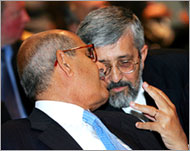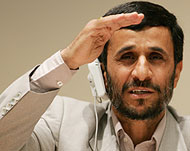Iran tests second batch of centrifuges
Iran has launched a second batch of centrifuges at its pilot nuclear-fuel plant amid efforts by the US and its Western allies to finalise UN sanctions against country for its nuclear stand.

Diplomats said on Monday that Iran fired up the new cascade of 164 interconnected centrifuges, which can enrich uranium for either power-plant or nuclear-bomb fuel, earlier this month to go with an initial network of 164.
But Iran appeared to be only testing the second cascade, without feeding UF6 uranium gas into it, as it has generally done with the first cascade, which first yielded a tiny amount of home-grown enriched uranium in April.
There was no immediate comment on the centrifuges from Iran, but Mahmoud Ahmadinejad, the Iranian president, said on Monday that Western powers were wrong if they thought his country would retreat under political pressure from its nuclear plans.
A senior diplomat familiar with UN nuclear inspections in Iran, said Tehran remained a long way from “industrial-scale” capacity that would signal its emergence as a nuclear power, as North Korea showed on October 9 by detonating an atomic device.
Running empty
“The second cascade was brought on line earlier this month but they appear to be just running it empty. That is, vacuum-testing to assess durability,” said the diplomat, who is close to the Vienna-based International Atomic Energy Agency.
“What they are not doing is building a stockpile of enriched uranium that would give them a bomb breakout ability, something like 100-200 kg. It is just a few grams here, a few grams there.”
 |
|
IAEA chief ElBaradei has been |
Sean McCormack, US state department spokesperson, said he was unable to confirm the action, but said Washington feared Iran was moving towards large-scale production.
“That would be something that would be quite alarming for the rest of the world because that means that you are able to start to produce – or at least have the capability to produce – large amounts of highly enriched uranium which lead you to the building blocks for a nuclear weapon.”
The Islamic Republic says it wants to enrich uranium only to generate electricity.
The West suspects that Opec’s number two oil exporter is trying to build bombs under the guise of a civilian programme to threaten Israel.
Diplomats said Iran could have fired up the second cascade at Natanz in central Iran months ago but might have decided to do so now only after the recent collapse of talks with the European Union to explore a compromise on enrichment that could avert UN sanctions.
Meeting
Condoleezza Rice, US secretary of state, met the UN agency’s head, Mohamed ElBaradei, but it was unclear whether the two discussed the reported expansion by Iran.
Meanwhile, the major powers have been working on possible UN sanctions against Tehran for a week now without any breakthrough.
McCormack said on Monday that there was “widespread agreement, although not total agreement”, among the US, France and Britain on a proposed resolution that would pressure Iran to halt sensitive nuclear fuel work.
 |
|
Ahmadinejad says Iran will not |
A need to address North Korea‘s announcement of a nuclear test on October 9, has contributed to the delay, McCormack said.
The US wants initial sanctions to target Iranian activities related to its suspected weapons programme – which Tehran denies.
The three European negotiators, Britain, France and Germany, have agreed to a text, but Washington has not yet signed on, Security Council diplomats said.
A draft text on Iran has not yet been distributed to Russia and China, both of which will study it before it goes to the full 15-member council, diplomats said.
Jean-Marc de la Sabliere, France’s UN ambassador, had hoped for a text by the end of last week, while Emyr Jones Parry, the British ambassador, predicted that the council would get the a draft resolution early this week.